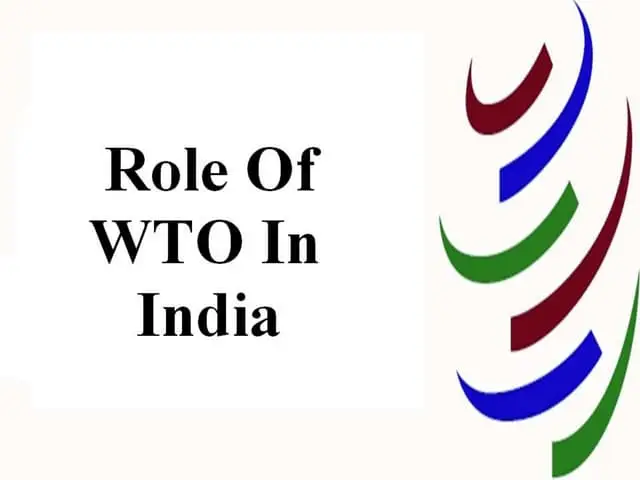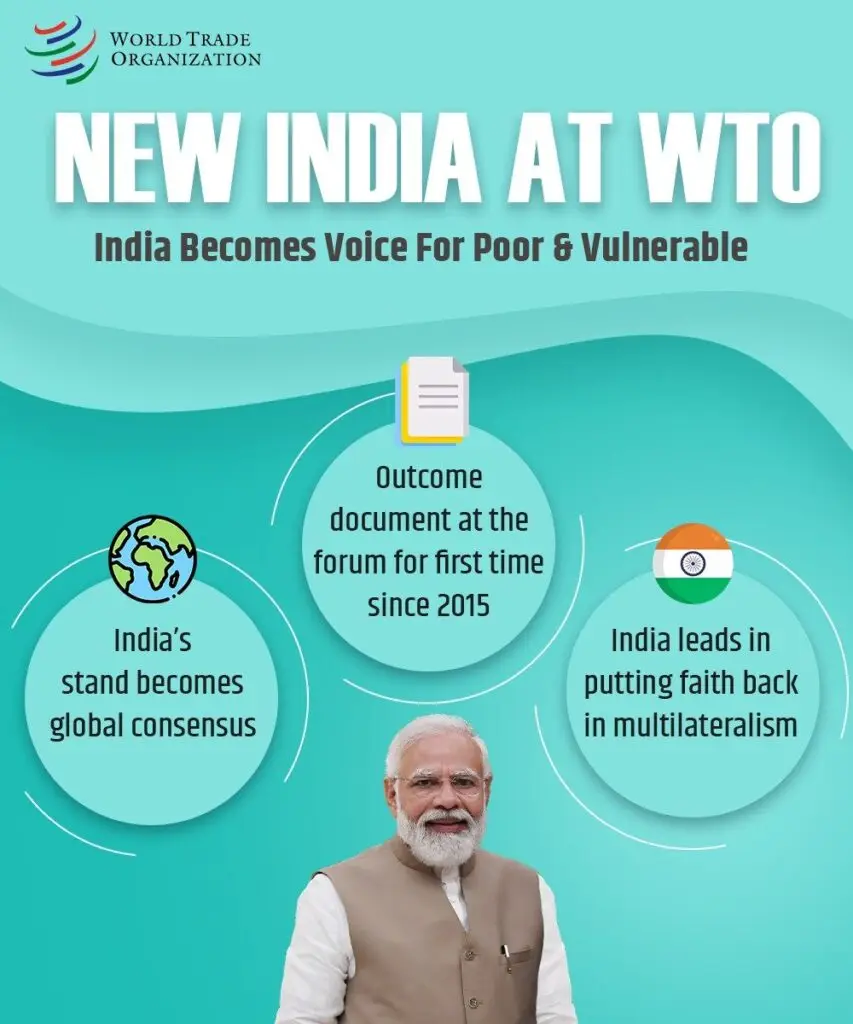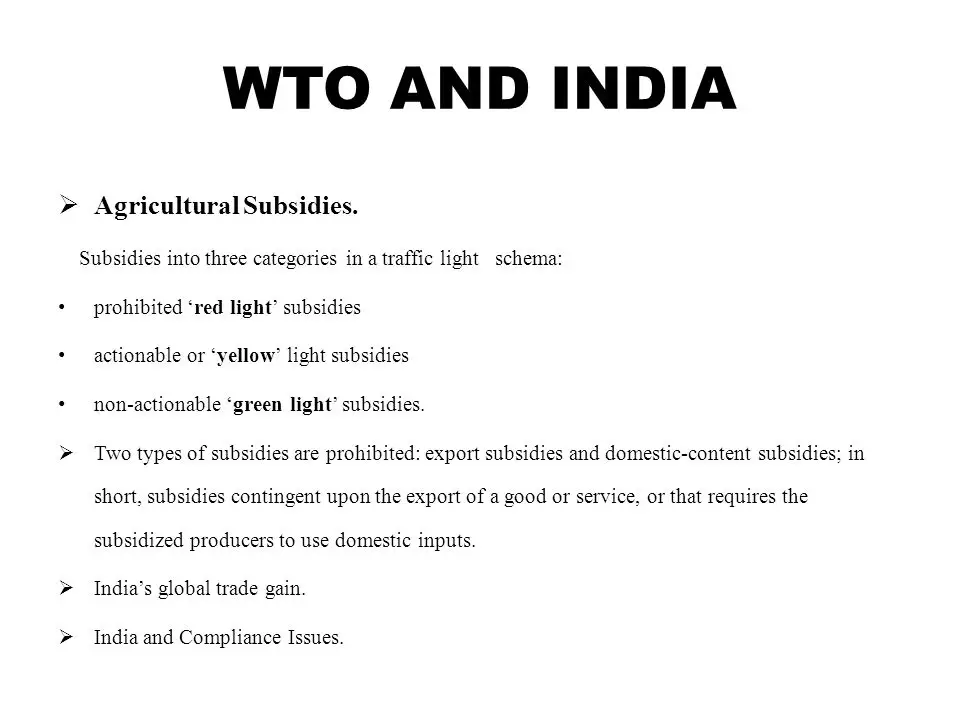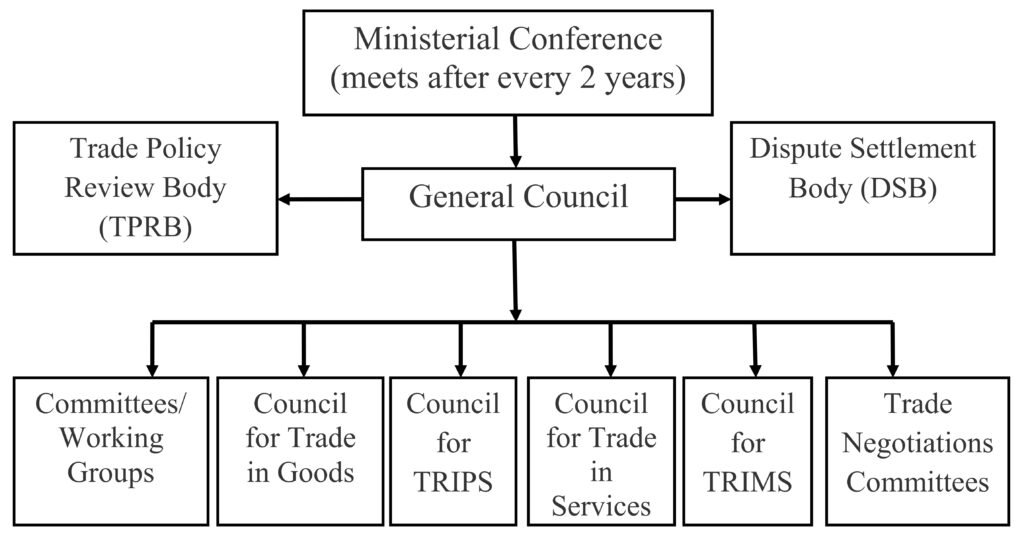
What is the World Trade Organization (WTO)?
The World Trade Organization (WTO) is an international body that deals with the global rules of trade between nations. Established in 1995, its primary goal is to ensure that trade flows as smoothly, predictably, and freely as possible. It provides a platform for negotiating trade agreements, settling trade disputes, and enforcing adherence to its agreements among member countries.
India’s Role in the World Trade Organization (WTO)
Membership and Participation
India is a founding member of the World Trade Organization (WTO) and has been actively involved since its inception. Being one of the largest and fastest-growing economies in the world, India’s role in the World Trade Organization (WTO) is significant. India uses the World Trade Organization (WTO) platform to advocate for the interests of developing countries and to push for a fairer global trading system.
Trade Policies and Agreements
India’s trade policies are closely aligned with World Trade Organization (WTO) regulations. This includes commitments to reduce tariffs, eliminate subsidies that distort trade, and open up markets to foreign competition. India is involved in various World Trade Organization (WTO) agreements such as the General Agreement on Tariffs and Trade (GATT), the General Agreement on Trade in Services (GATS), and the Trade-Related Aspects of Intellectual Property Rights (TRIPS) agreement.
Key Issues and Stances
Agriculture: India has consistently advocated for the rights of its farmers at the WTO. It seeks to protect its agricultural sector from the adverse impacts of liberalization. India has been vocal about the need for developed countries to reduce their agricultural subsidies, which create an uneven playing field.
Intellectual Property Rights: Under the TRIPS agreement, India has pushed for flexibility to ensure that its pharmaceutical industry can produce affordable generic medicines. This is crucial for public health, not just in India but globally.
Trade Facilitation: India ratified the Trade Facilitation Agreement (TFA) in 2016, which aims to simplify and modernize customs procedures. This is expected to boost trade by reducing costs and delays.
Dispute Settlement: India has been both a complainant and a respondent in various disputes at the World Trade Organization (WTO). It uses the dispute settlement mechanism to resolve trade conflicts, demonstrating its commitment to a rules-based trading system.
Challenges and Criticisms
India’s relationship with the World Trade Organization (WTO) isn’t without challenges. There are several areas of contention:
Special and Differential Treatment: India, along with other developing countries, insists on special treatment under World Trade Organization (WTO) rules. This is to ensure they can protect their industries and grow their economies. However, some developed countries argue that these provisions should be re-evaluated as emerging economies like India become more competitive.
E-Commerce and Digital Trade: As the global economy becomes increasingly digital, there are ongoing negotiations at the World Trade Organization (WTO) on rules for e-commerce. India has been cautious, emphasizing the need for data privacy and the protection of domestic industries.
Environment and Sustainability: The intersection of trade and environmental sustainability is another critical issue. India supports the idea that trade policies should not undermine efforts to address climate change and environmental degradation.
The Way Forward
India’s engagement with the World Trade Organization (WTO) will continue to evolve. As global trade dynamics shift, India is likely to play an even more significant role in shaping the future of international trade. Key areas to watch include:
Reforms in the World Trade Organization (WTO): India supports reforming the WTO to make it more effective and representative of the interests of developing countries.
Strengthening Regional Trade: Alongside its WTO commitments, India is also focusing on regional trade agreements, such as the Regional Comprehensive Economic Partnership (RCEP) and agreements with the European Union and the United States.
Balancing Domestic Interests with Global Commitments: India will need to carefully balance its domestic policy priorities with its international trade commitments to ensure sustainable and inclusive economic growth.
In summary, the relationship between India and the World Trade Organization (WTO) is a dynamic one, characterized by active participation, advocacy for fair trade practices, and a commitment to a rules-based trading system. As global trade continues to evolve, India’s role within the World Trade Organization (WTO) will undoubtedly remain pivotal.
India’s Foreign Exchange Management Act (FEMA) 1999

World Trade Organization (WTO) AND INDIA
In international economic relations particularly in international trade relations the greatest event to occur in recent times has been the setting up of (WTO) World Trade Organization in 1995. World Trade Organization (WTO) replaced GATT (General Agreement on Tariffs and Trade ) formalised in 1947.
GATT was signed by 23 countries in 1947. India was one of the founder members of GATT. Over the years the membership of GATT swelled and in 1994 touched 118 countries. GATT was all along concerned with the promotion of international trade through tariff reduction, doing away with non-discriminatory practices among trading partners, and evolving to counter protectionism.
The guiding principle of GATT was what is known as the MFN (most favoured nation) clause. This clause says that “any advantage, favour, privilege or immunity granted by a contracting party to any product originating in or destined for any country shall be accorded immediately and unconditionally to the like product originating in or destined for the territories of all contracting parties.”
The purpose of this clause was to discourage bilateralism and encourage multilateralism so that the world trade could expand in an orderly manner. However, formation of customs union or free trade area was allowed by GATT provided this encouraged flow of trade between the constituent territories and did not raise barrier to the trade of other member nations.
FUNCTIONS AND ORGANISATION OF WTO
The signing of the Final Act of the Uruguay Round by member nations of GATT in April 1994 paved the way for the setting up of the World Trade Organization (WTO). An agreement to this effect was signed by 104 members. The World Trade Organization (WTO) Agreement came into force from January 1, 1995 and India became a founder member of the World Trade Organization, by ratifying the WTO Agreement on December 30, 1994 (the present membership of WTO is 164 countries ).
The former GATT was not really an organization, it was merely a legal arrangement. On the other hand, the World Trade Organization (WTO) is a new international organization set up as a permanent body and is designed to play the role of a watchdog in the spheres of trade in goods, trade in services, foreign investment, intellectual property rights etc. It has the following five functions as set out in Article 3 :
The World Trade Organization (WTO) ‘shall facilitate the implementation, administration and operation, and further the objectives, of this Agreement and of the Multilateral Trade Agreements, and shall also provide the framework for the implementation, administration and operation of the Plurilateral Trade Agreements’.
The World Trade Organization (WTO) ‘shall provide the forum for negotiations among its members concerning their multilateral trade relations in matters dealt with under the Agreements in the Annexes to this Agreement.’
The World Trade Organization (WTO) ‘shall administer the Understanding on Rules and Procedures Governing the Settlement of Disputes.’
The WTO ‘ shall administer the Trade Policy Review Mechanism.’
‘With a view to achieving greater coherence in global economic policy-making, the World Trade Organization shall cooperate, as appropriate, with the International Monetary Fund and with the International Bank for Reconstruction and Development and its affiliated agencies’.
The World Trade Organization (WTO) and India have a complex and multifaceted relationship, shaped by India’s evolving economic landscape and the broader dynamics of global trade.
The Basics of the World Trade Organization (WTO)
The WTO, established in 1995, is an international organization that deals with the global rules of trade between nations. Its main function is to ensure that trade flows as smoothly, predictably, and freely as possible. It provides a forum for negotiating trade agreements, a platform for settling trade disputes, and a set of rules to govern international trade.
India’s Role in the WTO
Early Engagement
India was a founding member of the General Agreement on Tariffs and Trade (GATT), the WTO’s predecessor, and has been actively involved in the WTO since its inception. India’s initial engagement with the WTO was marked by a cautious approach, reflecting its protective stance on domestic industries and agriculture.
Economic Reforms and Liberalization
The 1990s were a turning point for India. Facing a severe economic crisis, India embarked on significant economic reforms, opening up its economy to foreign trade and investment. This shift aligned India’s policies more closely with WTO principles, promoting a more liberal trade environment.

Major Negotiation Points
India’s participation in the WTO has been characterized by active negotiation and advocacy on several key issues:
Agriculture: India has consistently pushed for the protection of its agricultural sector, which employs a large portion of its population. India argues for the right to maintain agricultural subsidies and support measures to ensure food security and rural livelihoods.
Intellectual Property Rights (IPR): India has advocated for a balanced approach to IPR, ensuring that patent regimes do not hinder access to affordable medicines. This stance was crucial during the negotiations on the Agreement on Trade-Related Aspects of Intellectual Property Rights (TRIPS).
Services Trade: India has sought greater market access for its burgeoning services sector, particularly in information technology and outsourcing. The General Agreement on Trade in Services (GATS) negotiations have been a focal point for India.
Special and Differential Treatment: India has championed the cause of developing countries, arguing for special and differential treatment to allow them to integrate into the global trading system at their own pace.
Disputes and Challenges
India has been both a complainant and a respondent in various WTO disputes. These disputes cover a range of issues from agricultural subsidies to import restrictions. Notably, India has challenged measures imposed by developed countries that it views as protectionist or unfairly targeting its exports.
Recent Developments
E-commerce and Digital Trade
The rise of digital trade has introduced new complexities in the global trading system. India has been cautious about binding rules on e-commerce at the WTO, emphasizing the need for a balanced approach that addresses developmental concerns and the digital divide.
Trade Facilitation
India ratified the Trade Facilitation Agreement (TFA) in 2016, committing to reforms aimed at simplifying and streamlining customs procedures. This move is expected to enhance India’s trade competitiveness by reducing transaction costs and improving efficiency.
The Doha Development Agenda
India remains a strong advocate of the Doha Development Agenda (DDA), which seeks to address the imbalances in the global trading system in favor of developing countries. However, progress on the DDA has been stalled, reflecting the broader challenges facing the WTO in achieving consensus among its diverse membership.

The Future of India’s Engagement with the WTO
As India continues to grow as a major global economy, its role in the WTO is likely to evolve. India faces the dual challenge of protecting its domestic interests while actively participating in shaping the global trade rules. Key areas of focus for the future include:
– Balancing Protectionism and Liberalization: Finding the right balance between protecting domestic industries and embracing liberalization to foster growth and competitiveness.
– Sustainable Development: Ensuring that trade policies are aligned with sustainable development goals, addressing environmental concerns, and promoting inclusive growth.
– Digital Economy: Navigating the complexities of the digital economy and ensuring that trade rules support innovation while protecting data privacy and security.
In summary, India’s engagement with the WTO reflects its broader economic ambitions and developmental priorities. As global trade dynamics continue to evolve, India’s role in the WTO will be crucial in shaping a fair and inclusive trading system that benefits all its members.